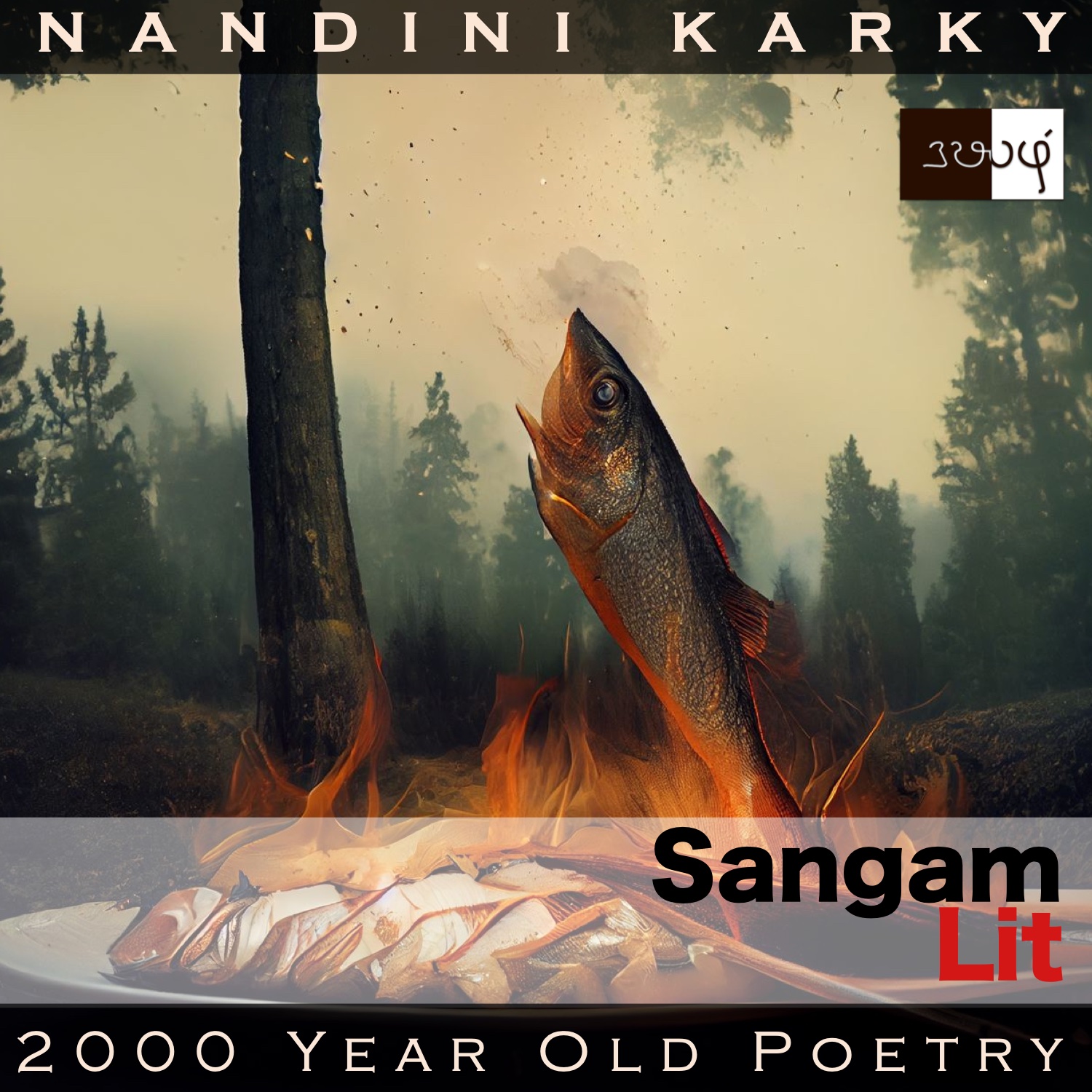Podcast: Play in new window | Download
Subscribe: Apple Podcasts | Spotify | Amazon Music | Android | iHeartRadio | TuneIn | RSS | More
In this episode, we perceive the changing nature of a nation caught in a war, as portrayed in Sangam Literary work, Puranaanooru 52, penned about the Pandya King Koodakaarathu Thunjiya Maaran Vazhuthi by the poet Maruthan Ilanaakanaar. The verse is situated in the category of ‘Vaagai Thinai’ or ‘king’s victory’ and talks about the past and future of enemy lands.

அணங்குடை நெடுங் கோட்டு அளையகம் முனைஇ,
முணங்கு நிமிர் வயமான் முழு வலி ஒருத்தல்,
ஊன் நசை உள்ளம் துரப்ப, இரை குறித்து,
தான் வேண்டு மருங்கின் வேட்டு எழுந்தாங்கு,
வட புல மன்னர் வாட, அடல் குறித்து,
இன்னா வெம் போர் இயல் தேர் வழுதி!
இது நீ கண்ணியது ஆயின், இரு நிலத்து
யார்கொல் அளியர்தாமே? ஊர்தொறும்
மீன் சுடு புகையின் புலவு நாறு நெடுங் கொடி
வயலுழை மருதின் வாங்குசினை வலக்கும்
பெரு நல் யாணரின் ஒரீஇ, இனியே
கலி கெழு கடவுள் கந்தம் கைவிடப்
பலி கண் மாறிய பாழ்படு பொதியில்,
நரை மூதாளர் நாய் இடக் குழிந்த
வல்லின் நல் அகம் நிறைய, பல் பொறிக்
கான வாரணம் ஈனும்
காடு ஆகி விளியும் நாடு உடையோரே!
Another poet sings the praises of this Pandya king and his words can be translated as follows:
“Disliking being in its cave in the fearsome, tall mountain clefts, where spirits reside, a powerful male tiger with perfect strength lifts its head up, with its heart filled with desire for flesh. Akin to how, after targeting a prey, the tiger rises with intent in the direction it wants, to attack and bring misfortune to the kings in the North, you rise up with the intent of waging terrible war, O Vazhuthi, the one who has well-built chariots!
If this is what you decide, then those others in this wide land are to be pitied indeed! In many of their towns, smoke of roasting fish spread the fragrance of flesh amidst the curving branches of the ‘maruthu’ trees growing near fields with tall crops. Such used to be the fertile land of your foes. Changing from that state of prosperity, as uproarious gods desert their pillars without any offerings, the common place would now be ruined. In these centres, where gambling dices of grey-haired elders made pits, making a home of those wide holes, speckled forest fowl would now lay eggs in those jungles, which were once festive lands of those whom you’ve decided to battle against!”
Time to delve deeper! The poet starts by bringing before us, a tiger lying down in its cave in the dark, high mountains. Deciding it has rested enough, it stretches and rises up, and seeking the taste of flesh, it sets out in a path, with its eye on a prey. That scene straight out of a nature documentary has been presented as a simile, to how this Pandya king now rises up, intending to battle with the kings in the North.
After detailing that present moment of the king, the poet declares that those enemies are done for! He then talks about how the smoke of fish roasting spreads the smell of flesh around the paddy fields and the branches of tall Indian Laurel trees. That right there is the scene of prosperity and riches in the land of the king’s foes. Not any more, the poet continues saying, once the king is done with them, the gods who used to reside in the mounted pillars would part away, citing a lack of offerings in the town centre. And in these spots, where grey-haired elders used to roll about dice making deep impressions in the ground below, now only wild hens lay their eggs. For that fertile land of fields and festivity has now turned into an unkempt forest fit only for wild hens, just because the Pandya king decided to wage war against the king of that land, the poet concludes!
The verse offers us two insights – First, war plays an immense role in changing the very topography of a place. What was once fields turn into forests and this seems to have been seen as a calamity that falls on a nation! The second insight is about what meant prosperity to the Sangam people. If we pause for a moment and think of prosperity in our present, one image would be that of soaring sky scrapers and speeding cars. Now, contrast this to that of the Sangam era, where prosperity was nothing more than the sight of fish being caught, crops being grown in the shade of age-old trees. And looking deeper, what we can infer from that image is that all that was of priority to the people then, was food security, guaranteed by the presence of rich water resources. Seeing this transition in priorities over two thousand years, I want to ask, what would prosperity mean in another two thousand years? Will it rise above food and wealth and enter an entirely new realm of the mind? Future’s food for thought!




Share your thoughts...